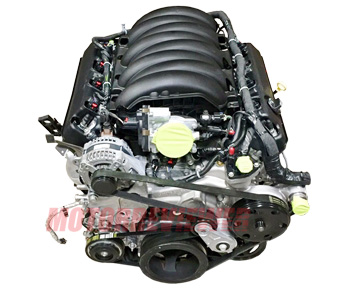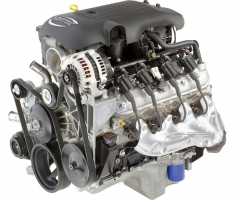Chevy 5.3 engine problems can include issues with oil consumption, lifter noise, and cylinder deactivation failure. These problems can lead to decreased engine performance and potential mechanical failures.
The 5. 3-liter V8 engine, commonly found in Chevrolet vehicles, has been known to experience certain issues. One common problem is excessive oil consumption, which can result in the need for frequent oil top-ups and potential engine damage. Another issue is lifter noise, which can be caused by a faulty lifter or inadequate lubrication.
Additionally, cylinder deactivation failure can lead to reduced fuel efficiency and engine misfires. It is important for Chevy 5. 3 engine owners to be aware of these potential problems and address them promptly to avoid further damage and costly repairs. Regular maintenance, including oil changes and proper lubrication, can help prevent these issues and ensure the longevity of the engine.

Credit: www.motorreviewer.com
Contents
Chevy 5.3 Engine
The Chevy 5.3 engine is part of the Generation III and IV small-block V8 engine family, often referred to as the LS family. This engine has gone through several iterations, with varying technologies and features:
- Gen III (1999-2007): The early versions of the 5.3 engine, often referred to as the Vortec 5300, were introduced in 1999. These engines featured cast-iron or aluminum blocks with a range of 285 to 315 horsepower, depending on the model.
- Gen IV (2007-Present): The fourth generation introduced features like Active Fuel Management (AFM), Variable Valve Timing (VVT), and, later, direct injection in the EcoTec3 versions. These engines are more fuel-efficient and produce higher power output, up to 355 horsepower in some models.
Read more about big block chevy engine guide.
Common Chevy 5.3 Engine Problems
Here’s a list of common problems associated with the Chevy 5.3 engine:
1. Oil Consumption Issues
One of the most frequently reported problems with the Chevy 5.3 engine, particularly in models from the mid-2000s to early 2010s, is excessive oil consumption. Owners often report that their engines are burning oil at an unusually high rate, sometimes as much as a quart every 1,000 miles.
Causes:
The primary culprit behind this oil consumption issue is the Active Fuel Management (AFM) system, which was designed to improve fuel efficiency by deactivating half of the engine’s cylinders under light-load conditions. The AFM system uses a special set of lifters and a valve system to control oil flow. Over time, the AFM lifters can fail, leading to increased oil consumption. Additionally, piston ring design flaws and issues with the positive crankcase ventilation (PCV) system can exacerbate the problem.
Solutions:
- AFM Disablement: Many owners choose to disable the AFM system using aftermarket tuners or have a professional mechanic do it. This can prevent the AFM lifters from causing further oil consumption issues.
- Engine Repairs: Replacing the AFM lifters, piston rings, or even the entire AFM system with a non-AFM setup can be an effective solution, though it can be costly.
- Regular Monitoring: Regularly checking and topping off oil levels can help prevent damage due to low oil levels, though it doesn’t address the root cause.
2. Lifter Failure and Ticking Noise
Another common issue with the Chevy 5.3 engine is lifter failure, often accompanied by a noticeable ticking noise coming from the engine. This problem is particularly prevalent in engines equipped with the AFM system.
Causes:
The lifters, which are responsible for opening and closing the engine’s valves, can fail due to wear and tear or due to complications with the AFM system. The ticking noise often indicates that a lifter has collapsed, meaning it can no longer maintain the proper pressure to keep the valve train functioning correctly.
Solutions:
- Lifter Replacement: The most direct solution is to replace the failed lifters. However, this can be a labor-intensive and expensive repair.
- AFM Deactivation: As with the oil consumption issue, disabling the AFM system can prevent future lifter failures.
- Regular Maintenance: Ensuring that the engine oil is clean and at the correct level can help reduce wear on the lifters.
3. Carbon Build-Up
Carbon build-up is a common issue in many modern engines, including the Chevy 5.3. This occurs when carbon deposits accumulate on the intake valves and combustion chamber, leading to a range of performance issues such as rough idling, reduced fuel efficiency, and increased emissions.
Causes:
The direct injection system used in the 5.3 engine can contribute to carbon build-up. Unlike traditional port injection, direct injection sprays fuel directly into the combustion chamber, meaning that the intake valves don’t get the benefit of being “washed” by fuel. Over time, this can lead to the accumulation of carbon deposits.
Solutions:
- Walnut Blasting: A popular method for removing carbon build-up is walnut blasting, where ground-up walnut shells are used to clean the intake valves.
- Regular Maintenance: Using high-quality fuel and engine additives can help reduce the rate of carbon build-up.
- Catch Cans: Installing an oil catch can can help prevent oil vapor from contributing to carbon deposits.
4. Fuel Injector Issues
Fuel injectors are critical components that deliver fuel into the engine’s combustion chamber. In the Chevy 5.3 engine, issues with the fuel injectors can lead to poor performance, misfires, and even engine damage if left unresolved.
Causes:
Fuel injectors can fail due to clogging from impurities in the fuel, electrical issues, or wear and tear over time. When a fuel injector is clogged or otherwise malfunctioning, it can cause the engine to run lean (too little fuel) or rich (too much fuel), both of which can cause problems.
Solutions:
- Injector Cleaning: In some cases, cleaning the fuel injectors can resolve minor issues.
- Injector Replacement: If cleaning doesn’t work, or if the injectors are too worn, replacement is the best option.
- Fuel Additives: Regular use of fuel additives designed to clean injectors can help prevent clogging and other issues.
5. Transmission Problems
While not directly related to the 5.3 engine itself, transmission issues are commonly reported by owners of vehicles equipped with this engine. These issues can range from hard shifting to complete transmission failure.
Causes:
The 5.3 engine is often paired with GM’s 6L80 or 6L90 automatic transmissions, which have been known to suffer from issues such as torque converter failure, valve body problems, and clutch wear. In some cases, these problems are exacerbated by the engine’s performance characteristics.
Solutions:
- Transmission Service: Regular transmission fluid changes and inspections can help prevent some of these issues.
- Torque Converter Replacement: If the torque converter is the issue, replacement is necessary.
- Transmission Rebuild: In severe cases, a complete transmission rebuild or replacement may be required.

Preventive Maintenance Tips for Chevy 5.3 Engines
To minimize the risk of encountering these issues, adhering to a strict maintenance schedule is crucial:
- Regular Oil Changes: Use high-quality synthetic oil and change it every 5,000 to 7,500 miles to ensure proper lubrication and reduce wear on engine components.
- Monitor Oil Levels: Check your oil level regularly and top off as needed, especially if you notice excessive oil consumption.
- Address Problems Early: If you notice any unusual noises, performance issues, or warning lights, address them promptly to avoid more severe problems.
- Use Quality Parts: When performing repairs or maintenance, use OEM or high-quality aftermarket parts to ensure the longevity and reliability of your engine.
Frequently Asked Questions
Here are some FAQs about the Chevy 5.3 engine problems –
- What is the most common problem with the Chevy 5.3 engine?
- The most common problem with the Chevy 5.3 engine is excessive oil consumption, particularly in models equipped with Active Fuel Management (AFM). This issue is often linked to the AFM system drawing oil into the combustion chamber.
- How can I prevent lifter failure in my Chevy 5.3 engine?
- Regular maintenance, including timely oil changes and using high-quality synthetic oil, can help prevent lifter failure. Disabling the AFM system may also reduce the risk of lifter issues.
- Is carbon buildup on intake valves a serious problem?
- Yes, carbon buildup on intake valves can lead to performance issues like rough idling, poor acceleration, and decreased fuel efficiency. It’s essential to address this issue promptly to maintain engine performance.
- How long can a Chevy 5.3 engine last?
- With proper maintenance, a Chevy 5.3 engine can last well over 200,000 miles. Regular oil changes, timely repairs, and using quality parts are key to achieving this longevity.
- What should I do if my Chevy 5.3 engine is consuming too much oil?
- If your engine is consuming excessive oil, check for signs of oil leaks, replace faulty piston rings or valve seals if necessary, and consider disabling the AFM system if it’s the source of the issue.
Conclusion
The Chevy 5.3 engine, while generally reliable, is not without its problems. Oil consumption, lifter failure, carbon build-up, and fuel injector issues are among the most common challenges faced by owners. However, with proper maintenance and timely repairs, these issues can often be managed or even prevented.
Whether you own a Chevy truck, SUV, or performance car with the 5.3 engine, understanding these potential problems can help you keep your vehicle running smoothly for years to come.